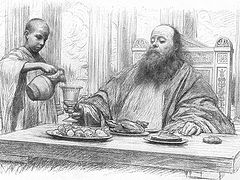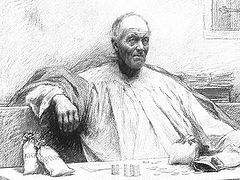Ephesians 4:1-7; Luke 12:16-21
We may have a hard time identifying with the rich man in the parable from today’s gospel lesson. He had such an abundance of grain and other possessions that he did not have room to store them; he needed to build larger barns in order to hold all his wealth. Once he did that, he planned simply to relax and enjoy himself for the rest of his days. He was so wealthy that he did not have to worry at all about providing food, clothing, and shelter for his family or paying his bills. In first-century Palestine, someone with such riches would have been rare indeed, and I doubt that anyone in our parish is in such comfortable circumstances today.
We may be tempted, then, to think that this parable has nothing to do with us. What does it have to do with people who struggle to make ends meet even though they work as hard as they can? What does it have to say to people who have to follow a budget and wonder how they will ever pay off their debts? Actually, it has a great deal to say to all of us, regardless of our financial circumstances. That is because the man’s problem is not that he is rich, but that he is self-centered. Notice that in the parable he speaks only of himself, of his possessions, and of his plans. He had become the measure of his own life. When God requires the man’s soul, however, it becomes clear that to live that way is simply to be a fool, for it amounts to laying up treasures for oneself in this world instead of becoming rich toward God.
No matter what our financial circumstances are, we all bear God’s image and likeness. That means that we will find fulfillment only in becoming more like Him in holiness, only by embracing the healing of our souls in Jesus Christ. Such a life is never one of self-centeredness. It is instead a life of communion with the Lord and all the neighbors in whom we encounter Him. It is a life in His Body, the Church, in which we flourish as members of one another, not as isolated individuals. That is how we participate by grace in the life of the Holy Trinity, Three Persons Who share a common life as one God.
Nonetheless, it is difficult to turn away from the self-centered individualism that can so easily lead to the spiritual poverty of the rich fool. We may not invest our lives in the accumulation of riches and possessions, but that does not mean that we are free from the temptation to live simply for ourselves. For example, we may judge everything in life according to our own preferences, as though there is something wrong if our will is not done in family life, work, school, or anywhere else. Without even realizing it, we then end up judging others based on how useful they are in doing our will. When they do not obey us, our passions become inflamed against them. The more we relate to our neighbors in that way, the more we will want our will to be done and the more we will become blind to the dangers of putting ourselves before others. Consider what kind of an impact that can have on our relationships with our neighbors, who bear the image of God as much as we do. Consider also its impact on our own souls. No matter what we believe, to live that way is to commit the idolatry of serving our own sovereign will above all else. It is simply to lay up treasures for ourselves instead of becoming rich toward God.
Treasures can take many forms, of course. We can invest our time, energy, and sense of self-worth in any of our activities or in the service of any of our traits or abilities, including how we look, how we feel, or how well we do literally anything. There is nothing wrong with giving any worthwhile endeavor or necessary concern the attention it deserves. The problem is when something becomes primarily a tool of self-centeredness. That means making an idol out of it, instead of offering it to God for Him to bless in fulfilling His purposes for it and for us. The point is God’s glory, not ours.
In the parable, it is no surprise that the man whose life was simply about acquiring wealth wanted to spend the rest of his days indulging in food, drink, and pleasure. All of his energy and attention had been focused on getting more of what he wanted for himself. The more that we gratify our self-centered desires, the stronger a hold they have over us and the more we become their slaves. The more settled the habit of getting what we want, the harder we will find it to limit our desires in any area of life. In the eyes of our corrupt world, a life of conspicuous self-indulgence may make someone look like a great success. Slavery to the passions, however, is hardly a path for fulfillment for those who bear the image and likeness of God.
We are now in the Nativity Fast, the 40-day period of abstaining from the richest and most satisfying foods as we prepare to celebrate the birth of our Savior at Christmas. The weeks of Advent are also a time for confessing and repenting of our sins, generosity to the needy, and intensified prayer. This season warns us that the Messiah is coming and we must be ready to receive Him. Because we are all so much like the foolish man in the parable, we need a challenge to our usual obsession with ourselves in order to prepare to celebrate the Lord’s birth. Otherwise, our Christmas will simply be about us enjoying ourselves to the point that we become blind to its having any greater significance than “eat, drink, [and] be merry.” Though it is odd to say in our culture, we need to make Advent a time of intentional spiritual discipline if we are to gain the health necessary to receive the great richness in God that the Savior was born to bring.
Otherwise, we will continue investing ourselves in ourselves, especially in the illusion that we are isolated individuals who will find fulfillment in getting whatever it is we want on our own terms. As appealing as that way of life may sound, it is simply a path to weakness and despair. It is neither suitable nor satisfying for those called, as St. Paul put it, “to lead a life worthy of the calling to which you have been called, with all lowliness and meekness, with patience, forbearing one another in love, eager to maintain the unity of the Spirit in the bond of peace.” We simply cannot find the healing of our souls or relate to one another as Christ commands if we make gratifying our own desires the measure of our lives. There is no greater threat to the peace of our souls or of our relationships with others than self-centeredness rooted in pride.
Even as we fast this Advent from rich food, let us fast from serving our own selfish desires, as we take steps to put the needs of others before our own preferences. Let us confess and turn away from habits of word, thought, or deed that only strengthen the illusion that our lives are our own, and especially those that keep us from truly loving our neighbors. Let us give generously of our time, energy, and resources to help those who will not help us achieve any of our goals in this world, but in whom we encounter and serve our Savior. Instead of sacrificing everything to serve our own sovereign will, let us offer ourselves to the Lord for the accomplishment of His gracious purposes for our lives and for our neighbors.
The Nativity Fast calls us to become rich toward God as we prepare to receive Christ at His birth. We should all use these weeks to invest ourselves in Him, for He alone brings fulfillment to those who bear His image and likeness. We would be fools to give our lives to anyone or anything else, including ourselves.




